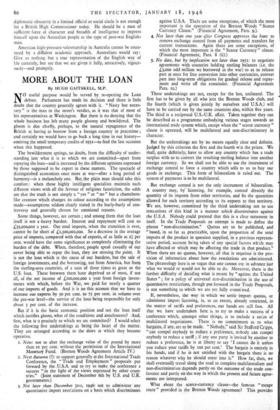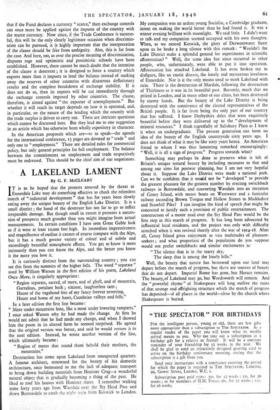MORE ABOUT THE LOAN
By HUGH GAITSKELL, M.P.
N0 useful purpose would 'be served by re-opening the Loan debate. Parliament has made its decision and there is little doubt that the country generally agrees with it. "Nasty but neces- sary" is the man in the street's verdict, as it was that of most of his representatives at Washington. But there is no denying that the whole business has left many people gloomy and bewildered. The gloom is due chiefly, perhaps, to the natural repugnance of the British at having to borrow from a foreign country in peacetime ; and certainly we would have to go back a long time in our history— omitting the small temporary credits of 1931—to find the last occasion when this happened.
The bewilderment springs, no doubt, from the difficulty of under- standing just what it is to which we are committed—apart from repaying the loan—and is increased by the different opinions expressed by those supposed to be expert in these matters. The spectacle of distinguished economists once more at war—after a long period of harmony—is a melancholy one. But the plain man should take this comfort: when these highly intelligent specialists maintain such different views with all the fervour of religious fanaticism, the odds are- that the truth is not simply a "yes "or " no " but a chameleon- like creature which changes its colour according to the assumptions made—assumptions seldom clearly stated in the hurly-burly of con- troversy and generally chosen for emotional reasons.
Some things, however, are certain ; and among them that the loan itself is not a .heavy burden. Interest and repayment will cost us £35,000,00o a year. Our total imports, when the transition is over, cannot be far short of kr,500,000,000. So a decrease in the average price of imports, compared with that of exports, of as little as 21 per cent, would have the same significance as completely eliminating the burden of the debt. When, therefore, people speak casually of our never being able to repay the loan, they are missing the point. It is not the loan which is the cause of our. burdens, but the sale of foreign investments, and the borrowing, not from America, but from the sterling-area countries, of a sum of three times as great as the U.S. loan. These between them have deprived us of most, if not all, of the net income of L200,000,000 a year from foreign invest- ments with which, before the War, we paid for nearly a quarter of our-imports of goods. And it is On this account that we have to increase OUT exports by 50 per cent. Ace 75 per Cellt. -in volume Over the pre-war level—the service of the loan being responsible for only about 5 per cent. of the increase.
But if it is the basic economic position and not the loan itself which justifies gloom, what of the conditions and attachments? And, first, what is it precisely to which we art committed? I would select the following five undertakings as being the heart of the matter. They are arranged according to the dates at which they become operative.
i.Now: not to alter the exchange value of the pound by more than so per cent.- without the permission of the International Monetary Fund. (Bretton Woods Agreement Article IV.) 2. Next Autumn (?): to support generally at the International Trade Conference, the "Trade and Employment" proposals put forward by the .U.S.A. and to try to.make the conference a success "in the light of the views expressed by other coun- tries." (Joint statement of December 6th by U.S. and U.K. governments.) 3. Not later than December 31st; I946: not to administer any quantitative import restrictions on a basis which discriminates
against U.S.A. Thete are some exceptions, of which the most important is the Operation of the Bretton Woods "Scarce Currency Clause." (Financial Agreement, Para. 9.).
4. Not later than one year after Congress approves the loan: to -remove exchange control from all payments and transfers for current transactions. Again there are some exceptions, of which the most important is the "Scarce Currency" clause. (Financial Agreement, Para. 8 (ii).) 5. No date, but by implication not later than 5955: to negotiate agreements with countries holding sterling balances (i.e. the L3,000 odd million we borrowed in the war) so as to release part at once for free conversion into other currencies, convert part into long-term obligations for gradual release and repay- ment and write off the remainder. (Financial Agreement Para. to.)
These undertakings are not, except for the last, unilateral. The first has to be given by all who join the Bretton Woods club, and the fourth (which is given jointly by ourselves and U.S.A.) will have to be carried out by the same countries also, within five years. The third is a reciprocal U.S.-U.K. affair. Taken together they can be described as a programme embodying various stages towards an international trade system which, except when the "scarce currency" clause is operated, will be multilateral and non-discriminatory in character.
But the undertakings are by no means equally clear and definite. Judged by this criterion the first and the fourth viin the prizes. We shall, quite definitely; have to allow any country which has a trade surplus with us to convert the resulting- sterling balance into another foreign currency. So we shall not be able to use the instrument of exchange control to force a country which sells to us to buy our goods in exchange. This form of bilateralism is ruled out. The system of payments is to be multilateral.
But exchange control is not the only instrument of bilateralism. A country may, IDY` licensing, for example, control directly the quantity of its imports from other territories, and fix the quantities allowed for each territory according to its exports to that territory. We are, however, committed by the third 'undertaking not to use resuictions of this kind in a manner .which discriminates against the U.S.A. Nobody could pretend that this is a clear statement in itself. In the Trade Proposals an attempt is made to define the phrase "non-discrimination." Quotas are to be published, and "based, in so far as practicable, upon the proportion of the total imports of the product in question supplied, in a previous represen- tative period, account being taken of any special factors which May have affected or which may be affecting the trade in that product." When there are no quotas, however, all that is requirea is the pro- vision of information about .how the _restrictions are administered. The phraseology here is so vague that one cannot say in advance just what we would or would not be able to do. Moreover, there is the further difficulty of deciding what is meant by "against the United States " ; for a policy of universal non-discrimination in the use of quantitative-restrictions, though put-forward in the Trade Proposals, is not something to which we are yet fully committed.
If, nevertheless, the way -in which we settle import. quotas, or administer import licensing, is, to an extent, already restricted, in the matter of tariffs and preferences, our hands are still free. All that we -have undertaken here is to try to make a success of a conference which, amongst other things, is to include a ser:es of multilateral negotiations. There is no commitment as to what bargains, if any, are to be made. "Nobody," said Sir Stafford Cripps, "can compel anybody to reduce a- preference, nobody can compel anybody to reduce a tariff ; if any one party is invited by another to reduce a preference, he is at liberty to say 'I cannot do it unless you reduce your tariffs by _so° per cent.' The bargain is entirely in his hands, and if he is not satisfied with the bargain -there is no reason whatever why he should enter into it." How far, then, we shall eventualljr travel along the road to complete multilateralism and non-discriminatiori'depends partly on the outcome of the trade con- ference and partly on -the way in whiah the present and future agree- ments are
What about the scarce-currency -clause—the famous "escape route" provided in the Bretton Woods agreement? This 'proVides
that if the Fund declares a currency "scarce," then exchange controls can once more be applied against the imports of the country with the scarce currency. Now since, if the Trade Conference is success- ful, this will be the only clearly legitimate occasion when discrimin- ation can be pursued, it is highly important that the interpretation of the clause should be free from ambiguity. Alas, this is far from the case. And here, too, as over the precise meaning of discrimination, disputes rage and optimistic and pessimistic schools have been established. However, there cannot be much doubt that the intention of the clause is deterrent ; it is designed to force a country which exports more than it imports to lend the balance instead of sucking away the reserves of other countries with disastrous deflationary results and the complete breakdown of exchange stability. If it does not do so, then its exports will be cut_ immediately through the exchange controls imposed by other countries. The clause, therefore, is aimed against "the exporter of unemployment." But whether it will reach its target depends on how it is operated, and, in particular, on the nature of the lending which the counti-y with the trade surplus is driven to carry out. These are intricate questions which cannot be discussed here. But they lead me to one suggestion in an article which has otherwise been wholly expository in character.
In the American proposals which are—so to speak—the agenda for the international conference, 13 pages are devoted to " trade" and only one to "employment." There are detailed rules for commercial policy, but only general principles for full employment. The balance between the commitments on employment and trade respectively must be redressed. This should be the chief aim of our negotiators.



























 Previous page
Previous page